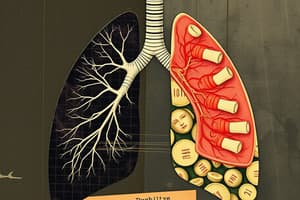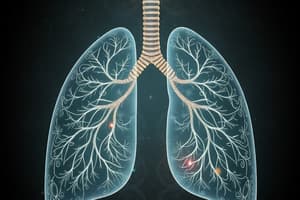Podcast
Questions and Answers
What is the primary function of the lungs?
What is the primary function of the lungs?
- Gas exchange (correct)
- Air filtration
- Regulation of body temperature
- Sound production
The lungs help maintain blood pH by regulating oxygen levels.
The lungs help maintain blood pH by regulating oxygen levels.
False (B)
What role do alveolar macrophages play in lung function?
What role do alveolar macrophages play in lung function?
They engulf and digest pathogens and debris.
The process of removing carbon dioxide from the bloodstream into the alveoli during exhalation is called __________.
The process of removing carbon dioxide from the bloodstream into the alveoli during exhalation is called __________.
Match the following functions of the lungs with their descriptions:
Match the following functions of the lungs with their descriptions:
Flashcards are hidden until you start studying
Study Notes
Function Of The Lungs
-
Gas Exchange
- Primary function: facilitate the exchange of oxygen (O2) and carbon dioxide (CO2) between the air and blood.
- Alveoli: tiny air sacs where gas exchange occurs; surrounded by capillaries.
-
Oxygen Supply
- Inhaled air contains approximately 21% oxygen.
- Oxygen is transferred from alveoli to the bloodstream and transported to cells throughout the body.
-
Carbon Dioxide Removal
- CO2, a waste product of metabolism, is transported from cells to the lungs.
- Exhalation removes CO2 from the bloodstream into the alveoli, which is then expelled.
-
Regulation of Blood pH
- The lungs help maintain acid-base balance by controlling CO2 levels.
- Increased CO2 lowers blood pH (more acidic), while decreased CO2 raises pH (more alkaline).
-
Air Filtration and Moistening
- Nasal passages filter inhaled air, trapping particles and pathogens.
- The respiratory mucosa moistens and warms incoming air to protect lung tissue.
-
Sound Production
- Lungs facilitate phonation by providing air to the vocal cords in the larynx.
- Sound is produced when air passes through the cords, causing them to vibrate.
-
Defense Mechanisms
- Mucociliary escalator: cilia on respiratory epithelium move mucus and trapped particles out of the airways.
- Alveolar macrophages: immune cells that engulf and digest pathogens and debris.
-
Thermoregulation
- The respiratory system plays a role in regulating body temperature through the exhalation of warm air and the evaporation of moisture from the respiratory surfaces.
Gas Exchange
- The main role of the lungs is to exchange oxygen (O2) and carbon dioxide (CO2) between air and blood.
- Alveoli are microscopically small air sacs crucial for gas exchange, enveloped by capillaries to facilitate this process.
Oxygen Supply
- Inhaled air is composed of around 21% oxygen, which is vital for cellular functions.
- Oxygen is absorbed from the alveoli into the bloodstream, where it is delivered to body cells for metabolism and energy production.
Carbon Dioxide Removal
- Carbon dioxide is a metabolic byproduct transported from body cells to the lungs for removal.
- Exhalation expels CO2 from the bloodstream into the alveoli, which is then eliminated from the body.
Regulation of Blood pH
- The lungs contribute to maintaining the body's acid-base balance by regulating CO2 concentrations.
- Elevated CO2 levels result in reduced blood pH (more acidic), while lower levels increase pH (more alkaline), affecting overall homeostasis.
Air Filtration and Moistening
- Nasal passages function as filters for inhaled air, capturing harmful particles and pathogens to prevent entry into the lungs.
- The respiratory mucosa plays a protective role by moistening and warming the incoming air, safeguarding lung tissues from damage.
Sound Production
- Lungs are essential for phonation, supplying air to the vocal cords located in the larynx.
- Sound is produced as air flows through the vocal cords, causing them to vibrate, which creates voice.
Defense Mechanisms
- The mucociliary escalator consists of cilia on the respiratory epithelium, which move mucus and trapped particles out of the airways to keep them clear.
- Alveolar macrophages act as immune defenders, engulfing and digesting pathogens and debris that reach the alveoli.
Thermoregulation
- The respiratory system aids in temperature regulation by exhaling warm air and promoting moisture evaporation from respiratory surfaces, thus assisting in body thermoregulation.
Studying That Suits You
Use AI to generate personalized quizzes and flashcards to suit your learning preferences.



